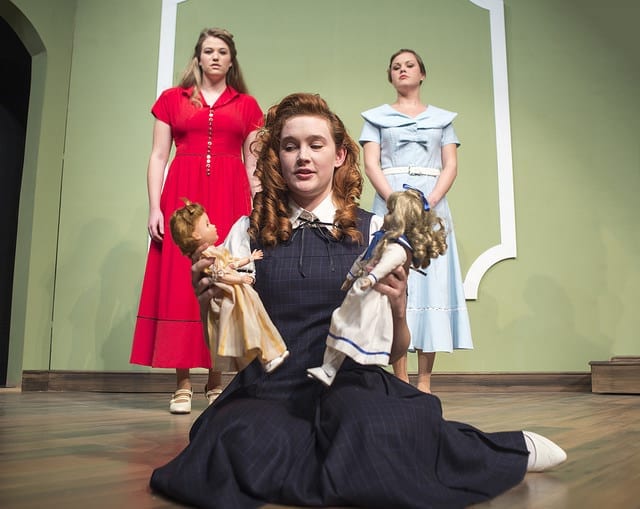SALT LAKE CITY — Director Mark Fossen has received much acclaim and a solid reputation for directing American classics in Utah, including The Crucible, Our Town, and Death of a Salesman. His recent direction of The Children’s Hour at the University of Utah’s Babcock Theatre continues to showcase his talents in this genre. Lillian Hellman‘s play first opened in 1934, and was considered edgy and controversial for its time in its subject matter as it dealt openly with the topic of homosexuality. As a result, it was banned in London, Chicago and Boston and was refused consideration for the Pulitzer Prize.

The play centers on the relationship between two women, Karen Wright (Kate Mikell) and Martha Dobie (Heather Maughan), who have worked hard to open up a girls’ boarding school. One of their students, Mary Tilford (September McKinnon) is a real terror of a student: a spoiled brat who manipulates, blackmails the other students, and fakes illnesses to get out of class and get what she wants. When Martha and Karen refuse to put up with her manipulative behavior further and won’t allow her to go on a school outing, Mary threatens to get even with them. Mary creates a story of how she and other students have witnessed an “unnatural relationship” between Martha and Karen. Mary convinces her wealthy grandmother, Mrs. Amelia Tilford (Cathy Ostler) of this and blackmails several of the other students to corroborate on her story. This leads to rumors that eventually shut down the school and damage Karen and Martha’s reputation in the community. Only later is it revealed that the story was fabricated, but only after Martha has committed suicide and Karen has lost everything, including her fiancée. The play explores the dangers of gossip, homophobia, and witch-hunts.

Kate Mikell brought a level of compassion and engaging naturalness to the role of Karen. She and Heather Maughan as Martha had a believable relationship and stylistically appropriate mannerisms of young women in the 1930’s with the right amount of class, vulnerability, yet mystery that raised question on the believability of Mary’s story. September McKinnon as Mary was perfect in this role as the selfish and manipulative pre-teen. McKinnon brought depth and explored a variety of tactics in each of her scenes in a disturbing and convincing manner. Her scenes with classmates Peggy Rogers (Carson Kohler), Rosalie Wells (Gabbi Lemanski), and Catherine (Sophie Gassaway) were especially well done and revealed much into each of their psyches, illustrating Mary’s ability to manipulate each of them in unique ways, whether through sheer force and violence or through blackmail in order to maintain control.
Cathy Ostler as Amelia brought a commanding presence to her role in her resolve to protect her granddaughter and the other girls at the boarding school, acting in what she believed to be her moral duty. Though as she learned the error of her judgment, Ostler was able to show a sincere character change and journey in Amelia as she strove to repair the damage she had done and make reconciliation.
Despite many strong acting, there were some weak performances, most notably Cody Thompson as Joe Cardin. Thompson seemed uncomfortable in his physicality with stiff movements and at times unnatural deliveries of many lines and moments. I failed to see the development or dimension in his character which greatly weakened many key scenes. His relationship with Karen was especially lacking. Also, the pivotal scenes where he confronts Amelia over the rumors and when he asks Karen if there is any truth in the rumors, disappointingly fell flat as I could not sense any clear motivation or emotional connection from Thompson. Taylor Kirch as the eccentric aunt, Mrs. Lily Mortar, brought much of the comic relief to the production; though at times her performance bordered on caricature which took away from an otherwise grounded production.
The costumes (under the design of Maddi Ussey) were well crafted and helped in creating interesting characters and establishing both class and time period. Though the wigs were not realistic and were distracting in such an intimate venue.
The storyline has aged well with its exploration of relevant topics and subject matter. Though the pacing at times was indulgent and certain scenes seemed to drag on, specifically early on in Act One. Running nearly three hours with two intermissions felt long and though scene changes were needed between each act, I wished that the production could have found a way to adjust the set without the need of a second intermission. However the set (under the design of Zoe Fetters) was beautifully done and captured both the time period as well as created a functional playing area that Fossen utilized effectively.
On the whole, The University of Utah’s Babcock Theatre presented a solid production of this important classic, with excellent direction, committed performances, and visually interesting storytelling from a talented cast and production team.
[box type=”shadow”]The Children’s Hour played at the Babcock Theatre on the University of Utah campus. The show closed February 15. For more information about University of Utah productions, visit www.theatre.utah.edu.[/box]
